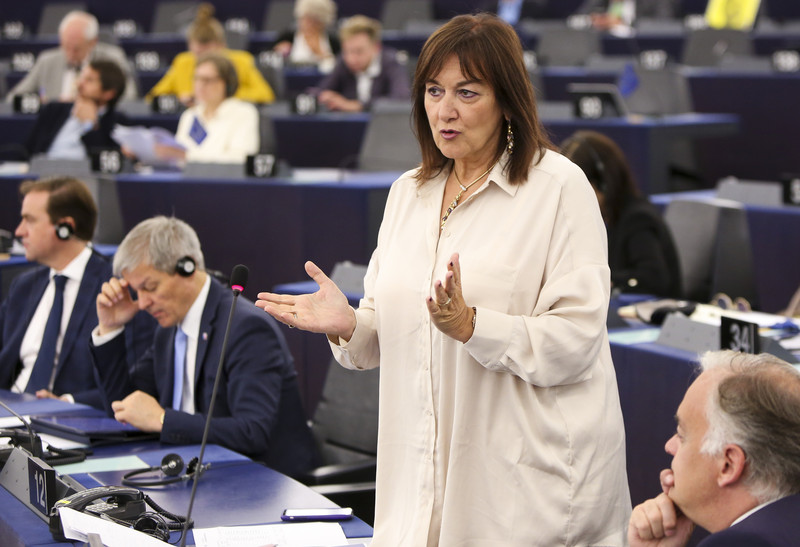INVESTIGATION EU NOMINEES!?

By: Elena Sanchez Nicolas
Photo: EUobserver
INVESTIGATION EU NOMINEES: WHERE DID SUICA’S MILLIONS COME FROM?
Questions about family wealth and EU values continue to hang over Croatia’s European Commission nominee, Dubravka Suica, ahead of next week’s European Parliament (EP) hearings.
According to her declaration to the Croatian parliament, the 62-year old former mayor of Dubrovnik and school teacher is worth more than €5m, Index.hr, a leading Croatian news website, has reported.
The website, as well as a Croatian NGO, recently asked her how she suddenly became so rich some 20 years ago – she owns three houses and two apartments in Croatia, a cottage in Bosnia, a yacht, and three cars.
And Suica did not deny the reports.
Some of it came from her husband and she inherited the rest, she told Croatian media on 22 September.
“My husband was a naval captain for 44 years and earned something through his working life. We inherited something. Everything is clear and transparent. There is no fear over our property and no fear that Croatia will be ashamed of it,” she said at the time.
But she declined to publish documents that would corroborate her account. Her office also declined to speak with EUobserver in recent days. And her story did not quite add up.
Her husband’s income, as a boat captain of more than eight years’ experience, would have been about €32,500 a year with an annual bonus of €956, according to the Salary Expert website.
Suica’s parents were also far from being millionaires, according to Ilko Cimic, an award-winning Croatian journalist.
Her late father used to make a living doing housework in Konavle, a small municipality outside Drubnovik, and her mother was a housekeeper, Cimic told EUobserver.
The Croatian state’s attorney office specialised in investigations related to corruption, Uskok, has looked into the discrepancies between Suica’s income and her estate.
But the outcome of that probe remains a mystery, because the information is considered “private”, Cimic noted.
And Suica’s work as mayor of Dubrovnik at the time that she became rich attracted a long list of controversies, including disputes with Croatian media.
Croatian pride
Her recent nomination, to defend “democracy” in the EU, had made Croatia proud, its prime minister, Andrej Plenkovic, who hails from the same ruling centre-right HDZ party as Suica, proclaimed last month.
It was a “recognition of Croatia’s strength in the EU,” he said.
But questions about Suica’s millions, as well as her political values, should be answered when MEPs hold a public hearing with the Croatian candidate in Brussels on 3 October, according to Gong, a Croatian pro-democracy NGO.
Her commission portfolio is meant to see her defend EU values and rule of law.
But back in her last role, as an MEP, she twice voted against EP resolutions on gender equality, Gong noted. She also flip-flopped on sanctions against Hungary and Poland over their judicial abuses at home.
“We are curious about how she sees her mission to defend the rule of law according to the way she voted on Article 7 for Hungary,” Gong said, referring to the EU treaty clause that governs the sanctions process.
“It’s extremely important for such a high-ranking politician to be fully transparent,” Gong added.
The European Commission’s other candidate for defending rule of law in Europe, Belgian minister Didier Reynders, might also have his hands full in next week’s hearings.
Reynders is under investigation by Belgian prosecutors on accusations of high-level corruption.
And if either or both of them come through the EP vetting process looking dirty, it will not help the commission president, Ursula von der Leyen, to make a fresh start.
EU trust
“Croatia has been given a portfolio on democracy, even though the state of democracy is deteriorating there,” Milan Brglez, a Slovenian MEP from the opposition socialist party, the SDP, told Croatian media last month.
Suica’s elevation to an EU post could damage trust in European institutions, Jandran Barac, another SDP politician warned.
“If they [MEPs] care about the survival of the EU, they need to restore public trust and remove these kinds of politicians from the institutions,” Barac told EUobserver.
Suica also filed a financial declaration when she became an MEP back in 2013.
But declarations submitted to the EU parliament only deal with potential conflict of interest with people’s portfolios and do not give an exhaustive inventory of what they own.
And EP financial vetting, which is done by the legal affairs committee, has been criticised for political games behind closed doors.
“I am French and I am very much surprised how it works here compared to France. In France, we have to give much more detail [on financial interests], it’s public scrutiny, and it’s done by an independent body,” Manon Aubry, a left-wing French MEP who sits on the committee, recently told this website.
The EU must “ensure that they [EU commissioners] are seen as whiter than white,” in order to win back public trust, Aubry also said, echoing Croatia’s Barac.




